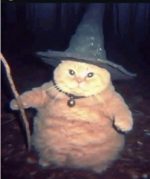You are using an out of date browser. It may not display this or other websites correctly.
You should upgrade or use an alternative browser.
You should upgrade or use an alternative browser.
Jack Law's Lord of the Rings Thread.
- Thread starter luka
- Start date
sus
Moderator
Extraordinary.[Bombadil] so fucking shit in the book, I managed to read that part
He's for people who think the songs were the best part of LOTR the books and probably laughed at the jokes in LOTR the films
Corpsey
bandz ahoy
I read a bit of lotr this weekend at my cousins' house, flicking through bits and pieces
it's very comforting escaping into that world isn't it, made me think i might actually read it
even though its a right load of cobblers
meanwhile, rings of power on amazon is A STEAMING PILE OF SHIT
it's very comforting escaping into that world isn't it, made me think i might actually read it
even though its a right load of cobblers
meanwhile, rings of power on amazon is A STEAMING PILE OF SHIT
Corpsey
bandz ahoy
I'm a few chapters into this now. I have, for whatever reason, made peace with it not being the same as the films this time around, and can see that there are virtues in the book that the film had to ruthlessly jettison to turn it into the high-octane thrill-fest the book certainly isn't.
One interesting stylistic thing I've noticed, which is preserved quite skilfully by Jackson in the films, is the seesawing between the jokey, childish prose that describes hobbit-world and a solemn, portentous style that doesn't so much creep as stride in whenever the subject turns to Mordor.
The story of gollum raises all sorts of unanswered questions, such as: if Smeagol was (according to Gandalf) surprisingly good at resisting the evil power of the Ring, how come he immediately strangled his mate wot found the ring—a murder he later apparently feels guilty about? Was smeagol eavol, in other words, before he ever saw the ring?
Another thing I quite like is when tolkein mentions how something became legendary later on, the example i can think of being how future generations of hobbits take Bilbo's disappearance at the birthday party as the basis for a santa-clause/easter-bunnyish character, with absolutely no notion left of where the story originated. A sort of self-reflexivity about myths and history.
One interesting stylistic thing I've noticed, which is preserved quite skilfully by Jackson in the films, is the seesawing between the jokey, childish prose that describes hobbit-world and a solemn, portentous style that doesn't so much creep as stride in whenever the subject turns to Mordor.
The story of gollum raises all sorts of unanswered questions, such as: if Smeagol was (according to Gandalf) surprisingly good at resisting the evil power of the Ring, how come he immediately strangled his mate wot found the ring—a murder he later apparently feels guilty about? Was smeagol eavol, in other words, before he ever saw the ring?
Another thing I quite like is when tolkein mentions how something became legendary later on, the example i can think of being how future generations of hobbits take Bilbo's disappearance at the birthday party as the basis for a santa-clause/easter-bunnyish character, with absolutely no notion left of where the story originated. A sort of self-reflexivity about myths and history.
sus
Moderator
I love Tom and Goldberry, I think they're really great
I think there's something to be said for Tolkien and Joyce being cousins, and Goldberry goddess of the river being a kind of Annaliviaplurabelle
The intro sections on hobbits are (Davenport tells us) apparently modelled on Tolkien's Kentucky roommate's stories about country bumpkins, down to the names (e.g. Baggins)
I think there's something to be said for Tolkien and Joyce being cousins, and Goldberry goddess of the river being a kind of Annaliviaplurabelle
The intro sections on hobbits are (Davenport tells us) apparently modelled on Tolkien's Kentucky roommate's stories about country bumpkins, down to the names (e.g. Baggins)
sus
Moderator
And just as a kind of travelogue, a pilgrimage diary essentially—and Tolkien, a medievalist, no doubt thought of the march to Mordor as a pilgrimage—
there's this wonderful in-touchness JRRT has with topography, with what topography affords and obscures and obstructs. The way that they become lost in Bombadil's forest. The way the woods seem to guide and rut them into a single, inevitable course. The way they break free into hills and clearings, get a lay of the land.
there's this wonderful in-touchness JRRT has with topography, with what topography affords and obscures and obstructs. The way that they become lost in Bombadil's forest. The way the woods seem to guide and rut them into a single, inevitable course. The way they break free into hills and clearings, get a lay of the land.
Mr. Tea
Let's Talk About Ceps
You think? A pilgrimage is usually a journey to a holy place, isn't it, while Mordor is the exact opposite. Although the journey certainly has the qualities of a tribulation.And just as a kind of travelogue, a pilgrimage diary essentially—and Tolkien, a medievalist, no doubt thought of the march to Mordor as a pilgrimage—
sus
Moderator
Yes, it's true, and I'm not super familiar with the pilgrim travelogue as a literary form. I read some essays claiming that pilgrimage was the primary genre of medieval travelogue, that pilgrims in some meaningful sense originated the modern travelogue as a form. And certainly there's something quite cloistered about the Shire, and something holy about Frodo's quest. And there seems to be some precedent for this pilgrimage-into-hell in e.g. the notion of "Dante the pilgrim" w/r/t Commedia.You think? A pilgrimage is usually a journey to a holy place, isn't it, while Mordor is the exact opposite. Although the journey certainly has the qualities of a tribulation.
Corpsey
bandz ahoy
There's lots of sentences like this in it which only the committed nerd can truly be bothered to decipher, but which I prefer to remain shrouded in mystery. Or as a stimulus to imagination.
I can see the appeal of this, this sense that there's a deep history behind it all, if you cared to investigate further. It gives the world a palpability. So does the endless (and yes tedious) descriptions of cutting through this field and going up this hill and down this dale.
And here's an example of that oddly whimsical stuff I mentioned before
"Away high in the East swung Remmirath, the Netted Stars, and slowly above the mists red Borgil rose, glowing like a jewel of fire."
I can see the appeal of this, this sense that there's a deep history behind it all, if you cared to investigate further. It gives the world a palpability. So does the endless (and yes tedious) descriptions of cutting through this field and going up this hill and down this dale.
And here's an example of that oddly whimsical stuff I mentioned before
Do we ultimately find out that Frodo wrote all this? Or is the identity of the 'author' kept a secret?"A fox passing through the wood on business of his own stopped several minutes and sniffed. ‘Hobbits!’ he thought. ‘Well, what next? I have heard of strange doings in this land, but I have seldom heard of a hobbit sleeping out of doors under a tree. Three of them! There’s something mighty queer behind this.’ He was quite right, but he never found out any more about it."
Corpsey
bandz ahoy
Definitely a christian undercurrent to the whole thing, what with Gandalf admonishing Frodo for wishing death on Gollum early on.Yes, it's true, and I'm not super familiar with the pilgrim travelogue as a literary form. I read some essays claiming that pilgrimage was the primary genre of medieval travelogue, that pilgrims in some meaningful sense originated the modern travelogue as a form. And certainly there's something quite cloistered about the Shire, and something holy about Frodo's quest. And there seems to be some precedent for this pilgrimage-into-hell in e.g. the notion of "Dante the pilgrim" w/r/t Commedia.
To me, knowing that Tolkien was a christian and was uncomfortable about the un-christian implications of the orcs, this begs the question—does GOD see all ends in this world? There's certainly a lot of talk of 'this was fated to happen' going on."Many that live deserve death. And some that die deserve life. Can you give it to them? Then do not be too eager to deal out death in judgement. For even the very wise cannot see all ends."
I was thinking last night after reading some of LOTR that it's an interesting concept, having the same God as Christians have but you're living on Andromeda 514 or wherever.
Corpsey
bandz ahoy
Both Catholics, though Joyce was obviously an apostateI think there's something to be said for Tolkien and Joyce being cousins, and Goldberry goddess of the river being a kind of Annaliviaplurabelle
Corpsey
bandz ahoy
Could be bullshit but I detect a similarity between them which could be seen as Catholic in a desire to systematise. To encompass everything in a system, to categorise. etc.
Tolkien though was a sort of anti-modernist, not hard to believe exactly but worth noticing that LOTR was published in 1954 and Ulysses in 1922.
I suppose LOTR is written with a completely different purpose in mind but obviously there's not (so far as i've read at least) a scrap of modernity in it, and no sex whatsoever.
Tolkien though was a sort of anti-modernist, not hard to believe exactly but worth noticing that LOTR was published in 1954 and Ulysses in 1922.
I suppose LOTR is written with a completely different purpose in mind but obviously there's not (so far as i've read at least) a scrap of modernity in it, and no sex whatsoever.
Corpsey
bandz ahoy
Earthsea is a different matter, I feel like there's so much profundity in that first book (I've not read the others) that I think it's much more worthy of sustained contemplation than Lord of the Rings.
Lord of the Rings is just pure escapism for me, I derive very little enlightenment from it.
I actually have been struck reading it this time by how moral it all is, that is - concerned with morality.
The idea that it's just a whimsical story about elves and wizards and dragons going whizz bang is very very very wrong.


